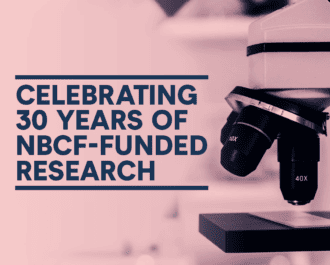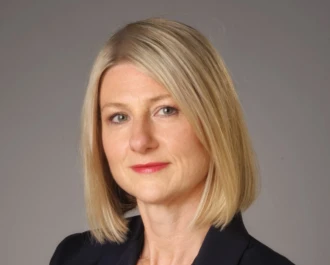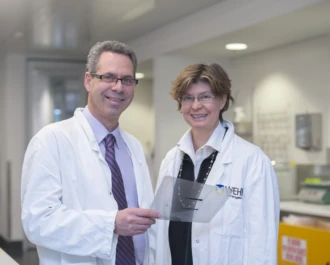
A quick glance at the laboratory webpage of Professor (Prof) Alexander Swarbrick shows a research team, whose members strongly interact with each other guided by Prof Swarbrick, resulting in impressive achievements of the laboratory.
The team’s vision is to develop new treatment strategies for breast and prostate cancer as well as melanoma. With the help of generous supporters such as NBCF, they are getting closer to this vision each day.
Prof Swarbrick, who has been supported by NBCF since he established his laboratory in 2008, is an expert in cellular genomics. This field of science revolves around the complex genetic makeup of individual cells, from the entire DNA code (its genome) to the secondary code that organises the genome (its epigenome), and the total genetic output of the cell (its transcriptome).
Using advanced technologies, Prof Swarbrick and his team investigate how cells work individually, as well as how they interact with each other. This is leading to exciting new advances in our knowledge of how cancer develops and grows, as well as opening the door to new treatment options.
The laboratory is also well known for a technical skill known as xenografting. In this procedure, tumour samples are harvested from patients with cancer who have their tumours removed and are then transferred into a mouse model. This allows Prof Swarbrick and the team to investigate individual cancer types in incredible detail, including trialling different drug therapies to analyse what treatment might be most effective without exposing the patient to experimental therapies. The laboratory now has over 70 of these xenograft models and continues to collect tissue samples from strong clinical collaborations.
Many of Prof Swarbrick’s scientific skills have been forged through an impressive 20-year research career. After he obtained his PhD in 2003 from the University of New South Wales, he undertook postdoctoral training with Nobel Laureate J. Michael Bishop at the University of California, San Francisco. This training was supported by a highly competitive CJ Martin Travelling Fellowship from the National Health and Medical Research Council (NHMRC).
Upon his return to Australia in 2008, Prof Swarbrick established the Tumour Progression Laboratory at the Garvan Institute of Medical Research. In 2012, he was appointed co-Head of the Breast Translational Oncology Program in the newly commissioned Kinghorn Cancer Centre. In 2022 he was appointed to co-lead the newly formed Strategic Program in Dynamic Cancer Ecosystems.
To date, Prof Swarbrick has been the recipient of six NBCF grants which mirror his journey through the field of cancer genomics. In 2007, he was awarded a Novel Concept grant to investigate the self-renewal of breast cancer stem cells. In 2011, an Early Career Fellowship followed, which allowed Prof Swarbrick to more thoroughly look at the molecular pathways that led to this self-renewal. Another Novel Concept grant in 2012 funded a genome-wide analysis of the role microRNAs play in making cancer cells susceptible to chemotherapy. This led to future work investigating treatment options, funded through a 2018 Investigator Initiated Research Scheme award.
A significant outcome from Prof Swarbrick’s work has been the Breast Cancer Cell Atlas, which was recently completed with support by a NBCF 2019 Investigator Initiated Research Scheme grant. The work, recently published in Nature Genetics, classified diverse tumour samples into nine subgroups, termed “ecotypes”. These ecotypes have unique cellular compositions and therefore correspond with a different clinical outcome in patients. This will help to reveal which treatment a tumour will best respond to.
Recently, Prof Swarbrick was awarded a NBCF 2022 Investigator Initiated Research Scheme award and a NHMRC Investigator Grant to continue his outstanding work. We are incredibly proud to support the excellent work of Prof Swarbrick and his team and look forward to more exciting discoveries in the future.
More News Articles
View all News



